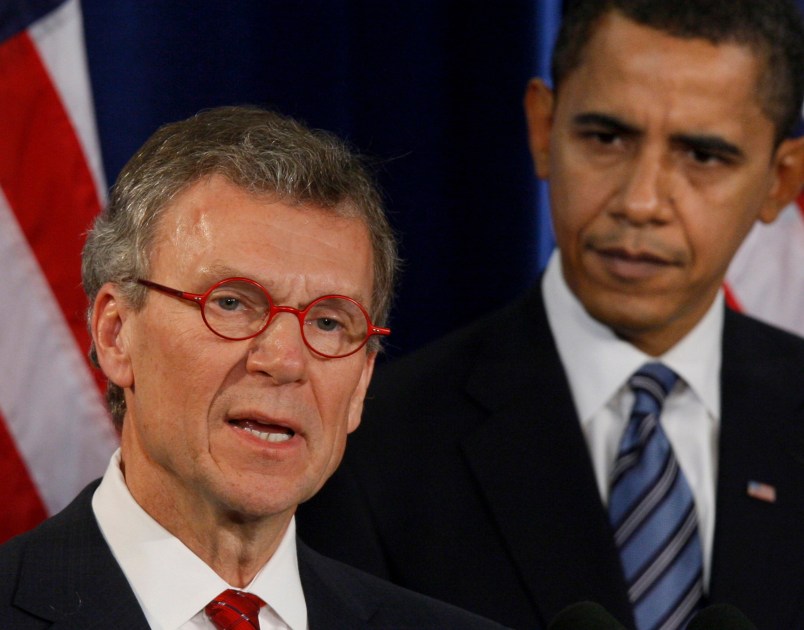Nobody has been watching Obamacare’s rollout like former Senate Majority Leader Tom Daschle (D-SD), the man who was supposed to oversee the largest transformation of the American health care system in a generation.
But errors on his tax returns torpedoed Daschle’s nomination as President Obama’s first secretary of the Department of Health and Human Services. After Daschle withdrew from consideration, Kathleen Sebelius was confirmed in his place, leaving Daschle to observe the Affordable Care Act’s drafting and implementation from the sidelines. Dashcle is currently a senior policy advisor in the government affairs practice at DLA Piper in Washington, where he advises clients on a range of issues, including health care.
So what does he think of the problematic launch of HealthCare.gov and the backlash over President Obama’s “keep your health plan” promise?
In an interview Friday with TPM, Daschle gave his bottom-line assessment: The administration is doing the best it can now, but things could have been handled better. The full conversation is below, condensed and edited for clarity.
TPM: What’s your initial assessment of the Oct. 1 launch?
Tom Daschle: Everybody expected there to be challenges as the rollout began on Oct. 1. Obviously, the challenges exceeded most people’s expectations. It’s certainly not unusual. Medicare Part D had similar problems. Massachusetts had similar problems. Oftentimes, a couple glitches just come with the territory.
With that said, some of these technical glitches probably could have been avoided, had we tested and integrated earlier in the process. But that’s history, and I think the good news is there is a very high expectation this is all going to be repaired and that the situation will be much different six months from now.
What do you think it will take to restore faith in the law and in the administration, given these problems?
People are going to have to first be able to access the site and work through the application process without any frustration.
Number two, people have to fully appreciate, beyond just the technical aspects of this experience, what the law’s new protections provide: the fact that they can’t be dropped, the fact that there’s no discrimination against pre-existing conditions. There are just so many benefits that will become real on Jan. 1, 2014, that they don’t fully appreciate.
When you see these reports about what was happening behind the scenes leading up to Oct. 1, what do you think could have been done differently?
What we’re doing right now is exactly the right thing, but I only wish we would have started two years ago. I have thoughts about why we didn’t, but I don’t know how accurate they are. I have suspicions and different notions, but none of them are necessarily based on any factual experience. I think I’ll keep my opinions to myself until I know more.
But two things are certain. Government still hasn’t acquired a technological prowess that exists in so many other contexts in the private sector. That alone is a huge factor, and I think that the magnitude of this challenge may have been underappreciated. It is enormously complicated.
What about the political stumbles? Do you think the administration could have better prepared people for what was coming, especially regarding canceled plans and the website’s problems?
A lot of things could have been done differently, including the messaging. But the administration clearly wanted to keep their message as simple as they could. They had to go through a very difficult election in 2012, and they’ve been battling Republicans on messaging from the very introduction of the legislation.
One of the real laws of good messaging is simplicity and repetition, so they chose simplicity and repetition. You can look back and say: Could it have been more accurate, more complete or more compelling? That’s something that we’ll probably continue to ask ourselves and debate for a long period of time.
What’s it been like to watch this unfold, knowing that in some alternate universe you would have been at the center of it?
It’s both exhilarating and painful. It’s exhilarating in that you realize this is the first time in 100 years that we achieved something that’s been aspirational in our country for a century. That to me is enormously fulfilling.
It’s frustrating in part because of how political it’s become, in part because it’s not being implemented as successfully as you had hoped, and in part we haven’t accomplished as much yet as I think we can.
The closer you are to it, the more fulfilling and frustrating it becomes.









